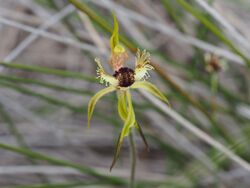Biology:Caladenia crebra
| Arrowsmith spider orchid | |
|---|---|

| |
| Caladenia crebra growing near Eneabba | |
| Scientific classification | |
| Kingdom: | Plantae |
| Clade: | Tracheophytes |
| Clade: | Angiosperms |
| Clade: | Monocots |
| Order: | Asparagales |
| Family: | Orchidaceae |
| Subfamily: | Orchidoideae |
| Tribe: | Diurideae |
| Genus: | Caladenia |
| Species: | C. crebra
|
| Binomial name | |
| Caladenia crebra A.S.George
| |
| Synonyms | |
| |
Caladenia crebra, commonly known as the Arrowsmith spider orchid is a species of orchid endemic to the south-west of Western Australia. It has one or two relatively large, greenish-yellow flowers whose lateral sepals have thin brown "clubs" on their ends.
Description
Caladenia crebra is a terrestrial, perennial, deciduous, herb with an underground tuber and a single hairy leaf, 10–20 cm (4–8 in) long and 6–10 mm (0.2–0.4 in) wide. In August or September it produces one or two flowers on the end of a stalk 25–50 cm (10–20 in) tall, each flower 50–60 mm (2.0–2.4 in) wide. The flowers are greenish-yellow, sometimes with red markings. The dorsal sepal is erect, 25 mm (1 in) long and 3–5 mm (0.1–0.2 in) wide. The lateral sepals are 25–45 mm (1–2 in) long, 4–7 mm (0.2–0.3 in) wide and may spread widely below the flower or cross each other. The sepals have thin brown "clubs" 6–10 mm (0.2–0.4 in) on their ends. The petals are 25–30 mm (0.98–1.2 in) long, 3–4 mm (0.1–0.2 in) wide and curve backwards. The labellum is greenish-yellow, 12–15 mm (0.5–0.6 in) long, 10–12 mm (0.4–0.5 in) wide with many upturned, narrow teeth up to 6 mm (0.2 in) long, along its sides, often with hooks on their ends. There are many densely crowded, dark purplish, finger-like "calli" crowded in distinct rows in the central part of the labellum. Flowering occurs from August to September. The fruit is a non-fleshy, dehiscent capsule containing a large number of seeds.[1][2]
Taxonomy and naming
Caladenia crebra was first formally described by Alex George in 1971 and the description was published in Nuytsia from a specimen found south of Dongara.[3] The specific epithet (crebra) is a Latin word meaning "crowded".[4]
Distribution and habitat
The Arrowsmith spider orchid is widespread and common between Dongara and Jurien Bay in the Geraldton Sandplains and Swan Coastal Plain biogeographic regions. It grows in shallow, sandy soil in low forest and shrubland.[1][5]
Conservation
Caladenia crebra is classified as "Not Threatened" by the Western Australian Government Department of Parks and Wildlife.[5]
References
- ↑ 1.0 1.1 Hoffman, Noel; Brown, Andrew (2011). Orchids of South-West Australia. (3rd ed.). Gooseberry Hill: Noel Hoffman. p. 83. ISBN 9780646562322.
- ↑ Jones, David L. (2006). A complete guide to native orchids of Australia including the island territories. Frenchs Forest, N.S.W.: New Holland. p. 68. ISBN 1877069124.
- ↑ "Caladenia crebra". APNI. https://id.biodiversity.org.au/instance/apni/531419. Retrieved 29 July 2016.
- ↑ Brown, Roland Wilbur (1956). The Composition of Scientific Words. Washington, D.C.: Smithsonian Institution Press. p. 790.
- ↑ 5.0 5.1 "Caladenia crebra". FloraBase. Western Australian Government Department of Parks and Wildlife. https://florabase.dpaw.wa.gov.au/browse/profile/1582.
Wikidata ☰ Q9673489 entry
 |

